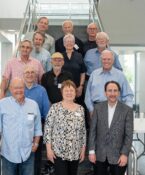How worried should you be about brain-eating amoeba?
 Recent reports of Iowa beaches closing this summer and three deaths from brain-eating amoeba in Texas in recent years (2019, 2020 and 2021) have brought into focus the lack of treatment for such infections. A researcher at The University of North Texas Health Science Center at Fort Worth’s School of Biomedical Sciences is advocating for a renewed effort to develop potentially life-saving drugs against Naegleria fowleri, an amoeba that causes a disease called primary amebic meningoencephalitis, which claims more than 97% of those infected.
Recent reports of Iowa beaches closing this summer and three deaths from brain-eating amoeba in Texas in recent years (2019, 2020 and 2021) have brought into focus the lack of treatment for such infections. A researcher at The University of North Texas Health Science Center at Fort Worth’s School of Biomedical Sciences is advocating for a renewed effort to develop potentially life-saving drugs against Naegleria fowleri, an amoeba that causes a disease called primary amebic meningoencephalitis, which claims more than 97% of those infected.
Dr. David Siderovski — a drug discovery expert, professor and chair of HSC’s Department of Pharmacology & Neuroscience within the School of Biomedical Sciences — has long been involved in unraveling the mechanics inside deadly infectious amoebas like Entamoeba histolytica and Naegleria fowleri toward developing unique drugs against these water-borne infections. He and his University of Iowa colleague, Dr. Dustin Bosch, have recently published their findings in the Jun 2022 Journal of Biological Chemistry issue.
Here, he responds to some of the most common questions people are asking right now about brain-eating amoeba:
What is a brain-eating amoeba?
The free-living amoeba Naegleria fowleri (a simple, single-celled organism) is found in both warm fresh water and soil. Exposure through the nose can lead to the rare but fatal disease of primary amoebic meningoencephalitis: a destructive inflammation of the brain and its lining within the skull (the “meninges”). While the incidence is low at less than 200 cases since the 1960s in the United States, the death rate from Naegleria fowleri infection is greater than 97% because the amoeba is highly resistant to current therapies and modern drugs.
What are the symptoms of a brain-eating amoeba infection?
Within two to 10 days after exposure, initial symptoms include fever, headache, nausea or vomiting. Later symptoms include stiff neck, loss of balance, confusion, lack of attention to surroundings and people, hallucinations and seizures.
Where does someone catch Naegleria fowleri?
In the United States, nearly half of all known infections have occurred either in Texas or Florida. Naegleria fowleri is naturally found in warm freshwater environments like lakes and rivers, geothermal water such as hot springs, poorly or minimally chlorinated swimming pools and warm soil, where the amoeba lives by feeding on bacteria and other microbes in the environment. Lake sampling in the southern United States indicates that Naegleria fowleri is commonly present in many southern lakes during the summer. Still, infections have also recently occurred in more northern states. However, Naegleria fowleri is not found in salt water like the ocean or the Gulf of Mexico.
Is there a vaccine?
No
Final advice?
If swimming in warm Texan waters, use a nose plug or nose clips, and do not forcibly immerse your head below the waterline, especially since diving or cannon-balling will force water up your nose, leading to the highest risk.





Social media